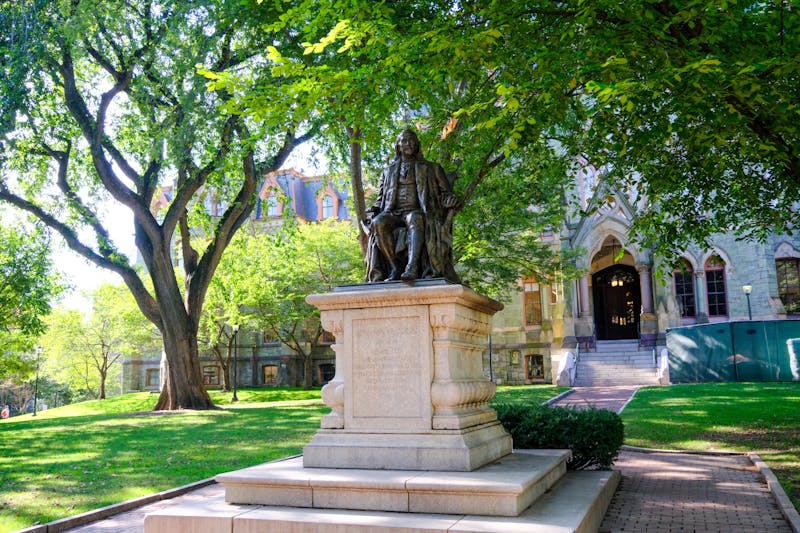
Amy Wax and Penn Law Dean Ted Ruger.
Credit: Julia SchorrWhile speaking at the National Conservatism Conference, Penn Law professor Amy Wax claimed that America would be “better off with more whites and fewer nonwhites.”
Wax’s comments disparaging non-Western cultures and immigrants should not come as a surprise. They are only the latest in a long record of objectionable and racist remarks. Penn Law School Dean Ted Ruger even recently characterized Wax’s comments as “repugnant” to the values of Penn Law and the University.
“For many years, our institutional efforts have been, and will remain with increased vigor, to build an academic community whose ethos and composition stands in direct opposition to these exclusionary views,” Ruger wrote.
Her remarks and continued association with this University are in direct conflict with Penn’s values. Due to the vague circumstances that allow for the termination of a tenured professor, it remains unclear if Penn has a legal justification for firing Wax, even if they wanted to. Still, the administration must continue to take steps to curtail the damage she is able to cause; barring her from teaching and continuing to speak out firmly and unwaveringly against Wax’s comments are two important steps to this end.
Regardless, thousands have called on the University to terminate her employment in an online petition. It appears for the time being that she will remain on the faculty, although she is taking a previously-scheduled sabbatical for the coming year, Penn spokesperson Stephen MacCarthy confirmed. In an op-ed from February 2018, Wax wrote that Ruger asked her to take a leave for the next school year following her controversial publications.
Last year, Wax made derogatory comments about black students in a video lecture that resulted in tangible consequences.
“I don't think I've ever seen a black student graduate in the top quarter of the [Penn Law School] class and rarely, rarely in the top half," Wax said while arguing against affirmative action.
Ruger categorically denied her claim in an email last year, writing that “contrary to any suggestion otherwise, black students at Penn Law are extremely successful, both inside and outside the classroom, in the job market, and in their careers."
Ultimately, following a petition by Penn Law students and alumni, Wax was banned from teaching mandatory first-year classes, although the rationale was only that she was breaking policy by discussing student grades. This was a good first step, but the fact remains that although her courses are no longer mandatory, Wax occupies teaching space and resources that could be used on courses that welcome all students.
Back in August 2017, Wax caused a stir by calling for a return to 'bourgeois' cultural values, touted the superiority of white, Anglo-Protestant culture, and said that “Everyone wants to go to countries ruled by white Europeans.”
Regardless of their intent, Wax’s recent remarks, like her long history of offensive work, serve to make people of color feel afraid, unwelcome, and un-American.
If you believe Penn’s modern message of inclusion and contrite retrospective — with the Penn Slavery Project’s continued efforts to uncover the University’s historic connections to slavery serving as one important example — then Wax’s racism is antithetical to the mission of this University.
If Penn is serious about its commitment to diversity and wants to support students of color, then disavowing Wax’s comments, as Penn Law Dean Ted Ruger did on Tuesday, is the least that this administration can do.
Freedom of speech is not freedom from consequences. The University has a responsibility to protect students not just from the words that Wax has said, but from Wax herself. Someone who is unapologetic in her consistent, racist remarks cannot possibly be a fair educator for students of color.
"While Penn touts itself as a beacon of diversity and inclusion with black and brown students showcased on its admission materials, the administration continues to turn a blind eye to the racism prevalent in its faculty," 2019 College graduate Luis Bravo’s petition reads.
Wax’s tenure allows absolute freedom of speech, and it is certainly to the benefit of research in general that researchers need not fear retribution for what they publish. But this protection need not extend to her teaching. The faculty handbook writes that “a lively stimulus to learn is best imparted by one who is adding to our store of knowledge.”
The only remaining contribution to this store of knowledge Wax is capable of making, it seems, is as an example of the kind of bigotry that should be cast out of society.
Dean Ruger has taken a good first step in disavowing Wax’s comments as divergent from the fundamental principles of Penn Law. But he can and must do more. Throughout history, those who allow hatred and bigotry to take root and prosper are not remembered as being neutral and reasoned, or lauded for following policy to the letter. They are remembered as cowards.
Editorials represent the majority view of members of The Daily Pennsylvanian, Inc. Editorial Board, which meets regularly to discuss issues relevant to Penn's campus. Participants in these meetings are not involved in the reporting of articles on related topics.
The Daily Pennsylvanian is an independent, student-run newspaper. Please consider making a donation to support the coverage that shapes the University. Your generosity ensures a future of strong journalism at Penn.
Donate






